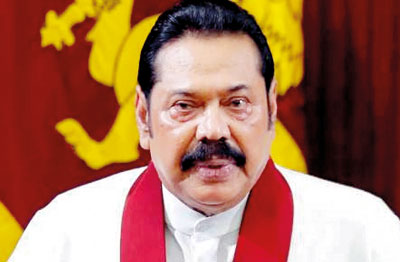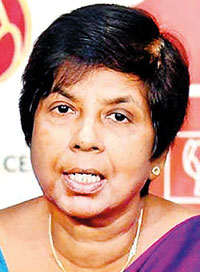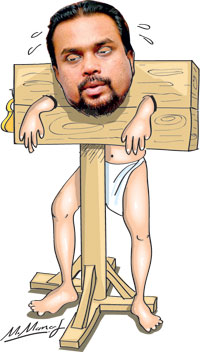Columns
Let Muslims be allowed to bury their COVID dead
 Lankan Muslims were over the moon on Wednesday when Prime Minister Mahinda Rajapaksa rose in Parliament and, in a brief reply to a question raised whether the Muslims will be allowed to bury their COVID dead, assured the House that thenceforth ‘’We will allow the bodies to be buried.”
Lankan Muslims were over the moon on Wednesday when Prime Minister Mahinda Rajapaksa rose in Parliament and, in a brief reply to a question raised whether the Muslims will be allowed to bury their COVID dead, assured the House that thenceforth ‘’We will allow the bodies to be buried.”The news of the Prime Minister’s statement to finally end the Muslim nightmare of cremation for their COVID dead spread far and wide and was ecstatically greeted. Two thousand miles away in Islamabad, a delighted Pakistani Prime Minister, Imran Khan, who is scheduled to arrive in Colombo as a State Guest this month, tweeted, “We welcome Sri Lankan PM Mahinda Rajapaksa’s assurance given in Sri Lankan Parliament today allowing Muslims to bury those who died from COVID19.”
So did the American Ambassador Alaina Teplitz express her delight in a tweet stating, “Welcome media reporting on PM’s announcement to end mandatory cremation of COVID victims. Implementation of a revised practice that is in line with international public health norms and respects religious rites is a positive action.”

PRIME MINISTER MAHINDA RAJAPAKSA: COVID burial assurance receives world acclaim
But the Muslim ecstasy and the world applause was, alas, short lived. It didn’t survive the sunrise.
The following day Thursday SLPP Gampaha MP Kokila Gunawardena addressing a press conference refuted that the Prime Minister had given the nod for COVID dead Muslim burials but that he had only said in Parliament that “Muslim burials will be allowed”. The SLPP MP said “the Prime Minister or the President cannot decide on permitting COVID burial and it will be done by ‘a committee of experts’.”
That same day in Parliament, COVID Minister Sudharshani Fernandopulle announced, “The Health Ministry is not taking decisions personally. The decisions are taken through the technical committee. This proposal has to be presented to the technical committee and we will have to act based on its agreement.”
But the origin of the COVID burial cockup lay in a question the SJB’s Anuradhapura District MP Rohana Bandara asked COVID Minister Fernandopulle in Parliament on Tuesday, the day before Prime Minister’s seeming approval for COVID burials.
The MP’s question was: “Since the government had not permitted the burial of COVID-19 victims fearing contamination of groundwater, what action would the Minister take to prevent children getting infected from water used by COVID-19 patients at a treatment facility at Kebithigollewa in Anuradhapura, gushing into an area near a school where students play?
Dr. Sudharshani Fernandopulle’s answer surprised all. She said: “The COVID virus was not transmitted through water. It is an airborne virus.”
Her tacit reply shattered the first and last defence raised against allowing the burial of Muslims, who have died of COVID, on the grounds that the coronavirus may seep out of the corpse and contaminate the ground water increasing its spread. Now with Sudharshani’s answer, that fallacy had joined the ranks of old wives’ tales. In the face of the latest virus info, according to Dr. Sudharshani with all her medical and scientific acumen behind her, it was old hat. The last bastion against Muslim COVID burials had fallen.
When the coronavirus first broke on to the world stage last January it did not even have a name to call its own and had to wait till February 11 for the World Health Organisation to baptise it as COVID-19. It was in that dismal hour when the world was first confronted with its deadly presence, scientists found to their bewilderment that their store of knowledge of the rampaging virus was shockingly scarce.
In that backdrop, the Lankan Government decided against burying those who had died of COVID but to cremate the corpses instead. Since the possibility existed that the coronavirus may seep from the buried putrefying bodies to the groundwater systems and contaminate it with the virus, a ‘better safe than sorry’ policy dictated that COVID burials should be banned.

COVID MINISTER: Coronavirus is not water borne
On March 31 when local COVID cases started to appear in significant numbers, the Lankan Government introduced the Provisional Clinical Practice Guidelines on COVID-19 which stipulated that cremation was the only mode of disposing the body to avoid further spread of the disease.
Much water has flowed under the coronavirus bridge since the Government first dictated in March last year a strict ‘no burial’ policy for those falling victim to the COVID epidemic.
On November 12 last year, the UN expressed concern over the Lankan government’s COVID-victim burial policy and expressed hope that the country “will revisit its policy”. In a letter to Prime Minister Mahinda Rajapaksa, the UN Resident Coordinator in Sri Lanka Hanaa Singer pointed out that prohibition of burials of COVID-19 victims was not backed by any scientific evidence. She also drew attention to the World Health Organisation issued guidelines dated March 24, 2020 and subsequent updated interim guidance on September 4, 2020 which held that cremation should be “a matter of cultural choice”.
The WHO had outlined that people who have died from Covid-19 can, therefore, be buried or cremated according to local standards and family preferences, with appropriate protocols for handling the body.
According to the London Guardian newspaper of December 4, “Sri Lanka is the only country aside from China which has mandated cremation for suspected coronavirus fatalities, with the government justifying it on the basis of concerns of the virus contaminating groundwater, and that COVID-19 victims’ bodies could be used as ‘biological weapons …. by certain groups.”
It’s funny that Lankan health chiefs who regularly refer to WHO recommendations on all matters COVID even as the Muslims refer to the Quran for guidance on all things spiritual, should have singularly chosen to look askance on the WHO conclusion that no evidence exists to suggest that burying the COVID dead pose any threat to the living. Instead the health authorities have opted to bury their heads in the ground awaiting the day some local technical committee appointed by Pavithra’s Health Ministry pronounces judgement on a matter international experts had already passed judgement on 10 months ago.
After the Government made a U turn on Thursday on the Prime Minister’s positive statement expressed the day before, an enraged SLMC leader Rauf Hakeem told Parliament, “Who is better than the Prime Minister to make a decision on behalf of the government? And who are these so-called experts in the Health Ministry who are blocking this, unfortunately creating racial tensions in this country?
It is, indeed, time to revisit the Government’s policy on banning burials for the COVID dead. Consider the following:
The Muslims strongly believe that after they die, there will be a physical resurrection on Judgement Day; and thus hold as a cardinal aspect of their faith, that the corpus is vital to make the passage to the afterlife. Cremation is banned. Burial is the prescribed method in the Quran. Burning the dead is considered a form of mutilation, forbidden by Allah.
The World Health Organisation has held, both in its updated interim guidance reports, that the COVID dead can be buried.
The world allows COVID burials. Italy, at the height of the COVID crisis, buried thousands in mass graves. If the virus contaminates the water, why does the Lankan Government allow swimming pools at clubs and hotels to stay open to the public?
The long held Lankan belief that burial may lead to the virus contaminating the ground water has been exposed as a myth without any scientific foundation. Furthermore the unfounded fear that the coronavirus could spread through the groundwater has been laid to rest by the COVID Minister’s assertion this Tuesday in Parliament that the coronavirus is not waterborne but airborne. The Minister’s new finding has effectively shattered the last bastion of opposition to burials.
The nation’s Prime Minister stated in Parliament this Wednesday that the Government would allow Muslim COVID burials. His statement has received international acclaim
Need any more reasons to do justice to the Muslims? Let the Muslims bury their COVID dead.
 NFF Wimal’s right royal side show to the galleryMinister Wimal Weerawansa was condemned to the pillory this week for any passing SLPP minister, MP or supporter to take potshots at him mercilessly with total impunity. NFF Wimal’s right royal side show to the galleryMinister Wimal Weerawansa was condemned to the pillory this week for any passing SLPP minister, MP or supporter to take potshots at him mercilessly with total impunity. His blasphemy which has outraged the adulators: Daring to suggest in an interview with the Sinhala Sunday Lankadeeepa last week that the time had come for Prime Minister Mahinda Rajapaksa to step down as leader of the Sri Lanka Podujana Peramuna and for President Gotabaya Rajapaksa to take his place instead. “President Gotabaya has become isolated at the Presidential Secretariat,” The National Freedom Front’s leader Wimal charged, attempting to give a lecture to the SLPP leadership on how the party should be run. “Gotabaya Rajapaksa hasn’t much political experience to boast of. What should have been done was to have made him the SLPP’s leader. Failure to do that has weakened the relationship between him and the parliamentary members. I do not understand for whose benefit this dire situation is allowed to continue.” This evidently got SLPP General Secretary Sagala Kariyawasam’s goat. The following day he appeared on national television to denounce Wimal Weerawansa’s unwanted meddling into the internal affairs of sovereign SLPP. Taking umbrage at Wimal’s unsolicited advice, Attorney-at-law Kariyawasam hit back. He said: “Wimal Weerawansa has told a Sinhala Sunday newspaper that Prime Minister Mahinda Rajapaksa must be replaced with President Gotabaya Rajapaksa as the leader of the SLPP. Weerawansa must understand the SLPP is not his party and he has no right to either make decisions or comments on the SLPP. The SLPP is of the position that Minister Wimal Weerawansa must withdraw the comment he made over the SLPP leadership and he should apologise to the general public.” But Wimal was recalcitrant. His reply: If it was wrong of me to have been one of the people responsible for bringing the Rajapaksas to power, then I apologise. Such was the stir it caused that it made the SLPP hold a parliamentary group meeting in Wimal’s absence to discuss the Wimal issue chaired by the Prime Minister. The situation became so tense, it had to be put off for another day when the man could be present. So what’s Wimal’s secret? Or game? Wimal‘s gratuitous advice to make Gotabaya the leader of the SLPP is in stark contrast to Rajapaksa brother Basil’s view on the matter. In an interview with the Indian Hindu newspaper in October 2019, Basil Rajapaksa, who created the party into being, said: “No matter who our candidate or President is, our leader Mahinda Rajapaksa will be the head of the government as PM. So, this arrangement suits us well. He is our leader, and he is the spiritual leader of our country.” No doubt, Wimal must take note. His explanation that what he meant was that Gotabaya Rajapaksa should hold some high office in the party and that he did not mean that Mahinda Rajapaksa should step down as leader, does not hold water when it is apparent that he clearly stated that Gotabaya should be appointed as leader, a fact that he himself did not seek to clarify or deny until three days after publication the date of which was the 6th Saturday. Secondly he was venturing into uncharted waters when he sought to dip a toe in it for some reason of his own without realising that even at the unfathomed depth of the Mariana Trench in the western Pacific, the old adage holds good: blood is thicker than water. And finally, enough of the ring side, side shows. The nation has enough circuses going on, simultaneously staged that another Wimal farce played undisguisedly to the gallery has ceased to amuse with Geneva around the corner and a whole host of day-to-day problems in the pocket. Especially when they all end with the carefully choreographed “all’s well that ends well” endings. It will be amazing if it doesn’t end the same way, this time too. | |



Leave a Reply
Post Comment